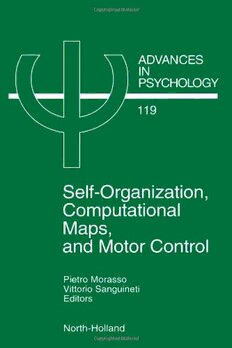Download Self-organization, Computational Maps, and Motor Control PDF Free - Full Version
Download Self-organization, Computational Maps, and Motor Control by Pietro Morasso and Vittorio Sanguineti (Eds.) in PDF format completely FREE. No registration required, no payment needed. Get instant access to this valuable resource on PDFdrive.to!
About Self-organization, Computational Maps, and Motor Control
In the study of the computational structure of biological/robotic sensorimotor systems, distributed models have gained center stage in recent years, with a range of issues including self-organization, non-linear dynamics, field computing etc. This multidisciplinary research area is addressed here by a multidisciplinary team of contributors, who provide a balanced set of articulated presentations which include reviews, computational models, simulation studies, psychophysical, and neurophysiological experiments.The book is divided into three parts, each characterized by a slightly different focus: in part I, the major theme concerns computational maps which typically model cortical areas, according to a view of the sensorimotor cortex as "geometric engine" and the site of "internal models" of external spaces. Part II also addresses problems of self-organization and field computing, but in a simpler computational architecture which, although lacking a specialized cortical machinery, can still behave in a very adaptive and surprising way by exploiting the interaction with the real world. Finally part III is focused on the motor control issues related to the physical properties of muscular actuators and the dynamic interactions with the world.The reader will find different approaches on controversial issues, such as the role and nature of force fields, the need for internal representations, the nature of invariant commands, the vexing question about coordinate transformations, the distinction between hierachiacal and bi-directional modelling, and the influence of muscle stiffness.
Detailed Information
| Author: | Pietro Morasso and Vittorio Sanguineti (Eds.) |
|---|---|
| Publication Year: | 1997 |
| Pages: | 655 |
| Language: | English |
| File Size: | 28.248 |
| Format: | |
| Price: | FREE |
Safe & Secure Download - No registration required
Why Choose PDFdrive for Your Free Self-organization, Computational Maps, and Motor Control Download?
- 100% Free: No hidden fees or subscriptions required for one book every day.
- No Registration: Immediate access is available without creating accounts for one book every day.
- Safe and Secure: Clean downloads without malware or viruses
- Multiple Formats: PDF, MOBI, Mpub,... optimized for all devices
- Educational Resource: Supporting knowledge sharing and learning
Frequently Asked Questions
Is it really free to download Self-organization, Computational Maps, and Motor Control PDF?
Yes, on https://PDFdrive.to you can download Self-organization, Computational Maps, and Motor Control by Pietro Morasso and Vittorio Sanguineti (Eds.) completely free. We don't require any payment, subscription, or registration to access this PDF file. For 3 books every day.
How can I read Self-organization, Computational Maps, and Motor Control on my mobile device?
After downloading Self-organization, Computational Maps, and Motor Control PDF, you can open it with any PDF reader app on your phone or tablet. We recommend using Adobe Acrobat Reader, Apple Books, or Google Play Books for the best reading experience.
Is this the full version of Self-organization, Computational Maps, and Motor Control?
Yes, this is the complete PDF version of Self-organization, Computational Maps, and Motor Control by Pietro Morasso and Vittorio Sanguineti (Eds.). You will be able to read the entire content as in the printed version without missing any pages.
Is it legal to download Self-organization, Computational Maps, and Motor Control PDF for free?
https://PDFdrive.to provides links to free educational resources available online. We do not store any files on our servers. Please be aware of copyright laws in your country before downloading.
The materials shared are intended for research, educational, and personal use in accordance with fair use principles.

